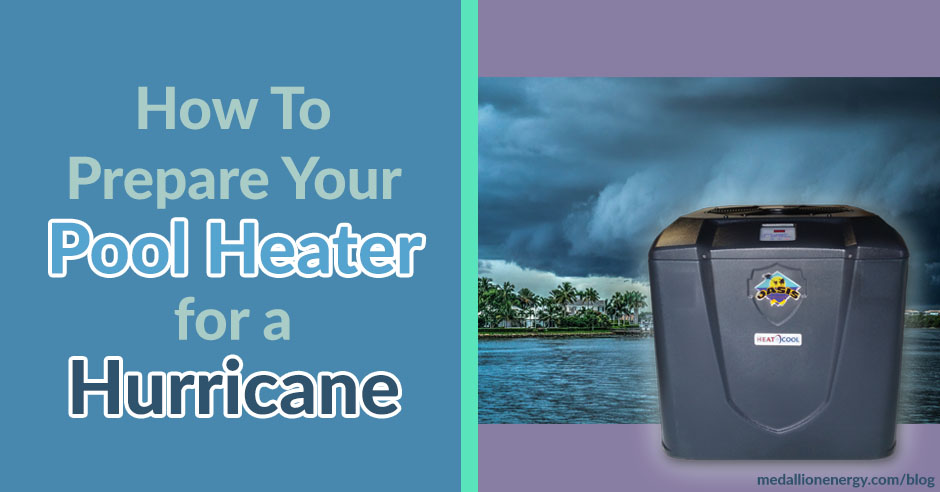Expecting a major storm? Keep reading to learn how to prepare your pool heater for a hurricane
This post is mainly for two groups of people:
- Pool owners who want to protect their swimming pool and prepare their pool heater for a hurricane
- Pool owners who are cleaning up their swimming pool and pool heater after a hurricane
With that said, there’s still plenty of valuable information for any pool owner who wants to be ready for a major storm. And you’ll find plenty of tips on how to keep your heat pump, gas, electric, or solar pool heater safe. So keep reading to learn how to prepare your pool heater for a hurricane and protect your swimming pool.
BUT, before you that, it’s important to tackle the problem at the root. And by that, we mean your swimming pool.
Do this first
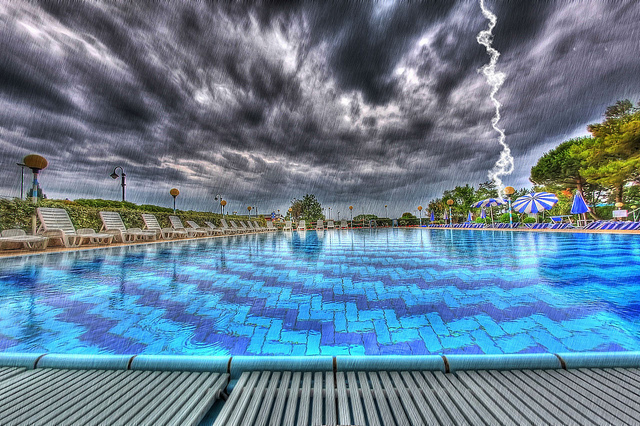


Prepare your swimming pool for a storm
Preparing you swimming pool for a storm doesn’t take long. It really just comes down to following a few simple steps. Following these steps will ensure that your swimming pool and pool equipment are ready for anything the storm brings.
Here are a few hurricane pool preparation tips:
- Power down all pool equipment at the breaker
- Keep the pool filled
- Shock the pool
- Store loose pool accessories
- Secure and store patio furniture
- Protect the pool equipment with waterproof wrapping
- Avoid covering the pool
[Learn 9 tips for preparing your pool for a hurricane]
After the storm
Once the hurricane passes, it’s likely that you’ll have some cleaning to do. With good storm prep, your work should mostly be limited to removing debris from the water and pool deck.
But to save time and make cleanup easier, keep these after hurricane tips for swimming pools in mind:
- Skim the pool to remove surface debris
- Remove bigger branches and debris by hand
- Inspect area around pool equipment for signs of raised water levels
- Inspect pool equipment for electrical damage
- If pool equipment area is dry, turn on the pump
- Add more chlorine, or shock the pool again
- Test and balance the water
- Let the pump run, and watch
[Learn the best way to clean up your pool after a storm]
How To Prepare Your Pool Heater For A Hurricane
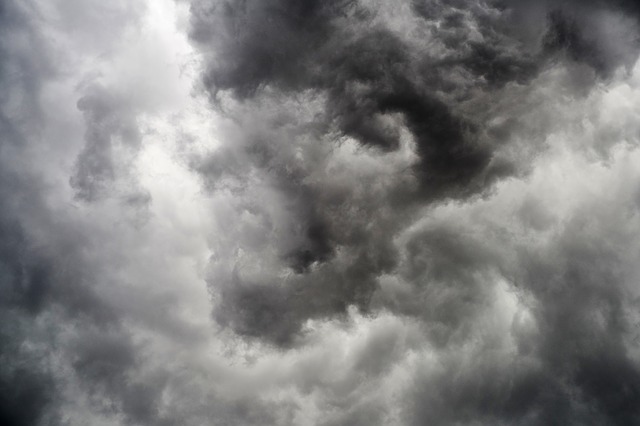


Now that you’ve covered all your bases with good swimming pool hurricane prep, it’s time to focus on the most important piece of pool equipment you own.
Your pool heater.
It;s that wonderful machine that makes cozy autumn swims possible and cooling summer dips plentiful.
From here, we’ll go over the best steps for preparing each type of pool heater for a major storm or hurricane.
How to prepare a heat pump pool heater for a hurricane
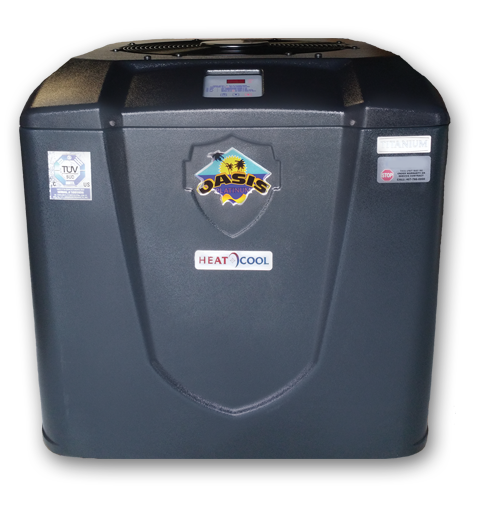


A heat pump is a resilient and eco-friendly pool heater that can heat and cool your pool on command. But even the toughest pool heaters need to be protected.
Good pool heat pump maintenance and prep is the best way to avoid hurricane damage and the most effective way to extend your pool heat pump’s lifespan.
Before
- Power down the heat pump at the breaker
- Cover the fan grille with waterproof material to avoid internal water damage
- Tightly wrap a waterproof tarp or sheet around the pump, making sure to cover the panel and electrical connections.
After
- Inspect area around the heat pump for signs of raised water levels
- If area is dry, remove wrapping
- If fan grill was not covered, remove all visible leaves or twigs
- Power on your filter pump, then power on the heat pump
- Check the display for any error codes (see pool heater troubleshooting)
How to prepare a gas pool heater for a hurricane
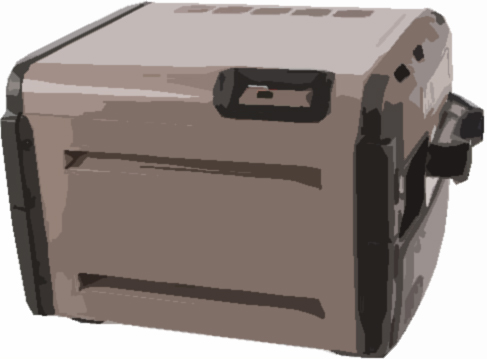


Gas pool heaters offer the fast heating available. There’s no denying that. If you need heat in a pinch, gas heaters can do it.
But, it’s important to remember that a gas heater’s speed comes at the cost of the highest monthly operation costs. Gas is quick, but it isn’t cheap
With that said, there a few things you’ll want to do to keep you gas heater going strong after the storm.
Before
- Shut down the gas heater
- If possible, turn off the gas supply line
- Securely wrap the heater with waterproof material
After
- Check area for signs of raised water levels
- If area around equipment is dry, unwrap the heater
- Check if the heater’s gas line is disconnected
- If disconnected and shut off, reattach
- If disconnected and leaking gas, contact gas company
or pool company immediately
- With a connected gas line, power on the pool pump, then the heater
- Watch for any signs of irregular performance
How to prepare an electric pool heater for a hurricane
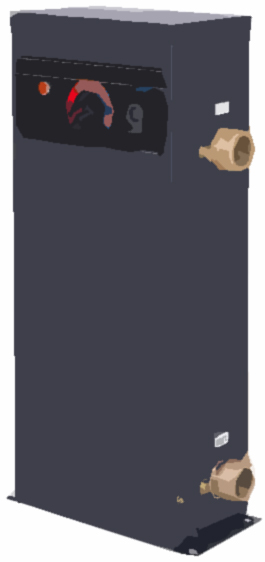


An electric pool heater is another speedy pool heating option, albeit not as fast as gas. Most of the time, these pool heaters are seen in smaller spa setups.
But on the off chance you have one heating your swimming pool, well then this section is just for you.
Before
- Power down the electric pool heater at the breaker
- If possible, disconnect the power line
- Wrap the heater in a waterproof tarp or sheet
After
- Check the area around the equipment for signs of raised water levels
- If the area is dry, unwrap the heater
- Inspect the heater for any damage, then reconnect to power
- Turn on the pump, then turn on the heater
- Watch for any odd performance
How to prepare a solar pool heater for a hurricane
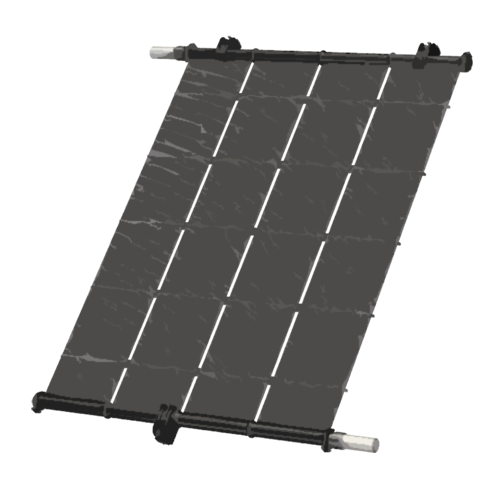


Last but not least are solar heaters. They’re eco-friendly and affordable, and they’re fairly simple. Although they’re not the fastest heating option, they’re still a nice alternative for pool owners in sunnier states. But most of the time, solar pool heaters are used as backups to heat pumps and gas heaters.
Although they’re not the fastest heating option, they’re still a nice alternative for pool owners in sunnier states. But most of the time, solar pool heaters are used as backups to heat pumps and gas heaters.
Some solar pool heater installations feature a series of several large panels, while others might use more compact solar collectors.
Before
- Shut down the pool pump
- If solar panels are fixed to the roof, do not remove
- If your solar pool heater using a smaller solar collector, disconnect it and store it indoors
- Wrap all pool equipment in waterproof material
After
- Check the area around the pump for signs of water damage
- If dry, reconnect your solar collector
- Turn on the pool pump
- Wait for a sunny day to test performance
Closing thoughts
If you followed these tips on how to prepare your pool heater for a hurricane, then you’ve effectively protected your most important swimming pool investment. And as long as you prepped your swimming pool beforehand, storm cleanup will be much easier.
Now that you’ve gotten all the work out of the way, you might some helpful ideas in these posts:

